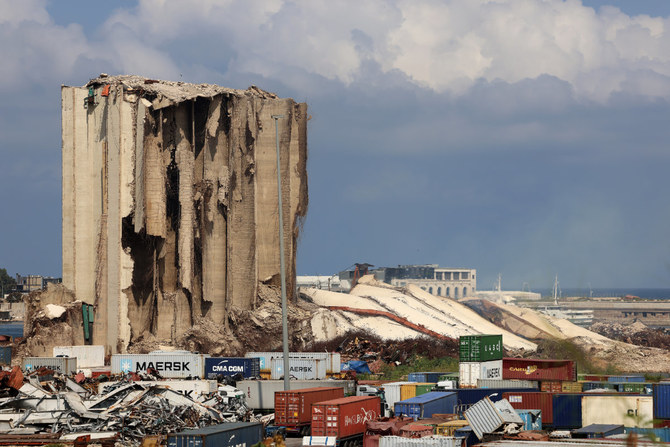BEIRUT: Three years after being damaged in an explosion, vital grain silos at Beirut port remain unusable, posing a growing threat to Lebanon’s food security.
The silos, which were hit by the blast and then gradually collapsed, had capacity for 120,000 tons of wheat and grains. As a result, Lebanon is now unable to import large quantities of wheat as it has nowhere to store it.
“Today, the silos are encircled by wire to prevent people from approaching them and preserve public safety,” Dr. Bechara Asmar, head of the port’s workers’ syndicate and medical department, told Arab News.
“The authorities spray the surrounding areas with pesticide from time to time to prevent the spread of fungi as a result of the rotting grains and wheat in the vaults of the silos,” he said.
Asmar added that while the silos could not degrade any more than they already had, “the restoration work of the three basins adjacent to the silos hasn’t started. It is a paralyzed and isolated place.”
While the families of the victims reject the demolition of what is left of the silos, some political figures do not want them to be rebuilt on their original site.
Former Minister Fadi Abboud questioned the economic viability of “the reconstruction of the silos on land that costs $10 billion, besides the increase in the number of trucks entering and exiting the port, making it the most overcrowded part of Beirut.”
Asmar said that Abboud had proposed turning the existing port into an entry point for tourist vessels and moving commercial operations to Tripoli to reduce traffic congestion.
“This proposal is rejected,” he said. “We can build tourism ports at any location on the Lebanese coast, but the importance of the Beirut port is that it is one of the best basins on the Mediterranean Sea.
“It is deep, distinctive and highly equipped to be an important trade corridor, and can also complement the port of Tripoli.”
The devastating explosion that hit Beirut port on Aug. 4, 2020 damaged the high-rise grain silos, which were considered a landmark of the city. The vast tanks actually shielded the southern part of Beirut from destruction by absorbing most of the force of the blast.
But several people were killed when part of the silos collapsed.
Just days before the second anniversary of the explosion, a fire erupted in the silos and their surroundings, triggered by grain that had fermented and ignited inside. The blaze continued for several weeks as firefighters were unable to control the flames due to the failing state of the silos.
According to customs statistics, Lebanon imported about 754,000 tons of wheat in 2021 and consumed about 60,000 tons of it per month.
Asmar said the silos used to hold enough reserves for between six months and a year.
“Today, the mills that are importing common wheat for Lebanese pita bread are storing it in their relatively small warehouses. The total imported quantity covers three months at most.”
After Russia’s invasion of Ukraine — the two countries from which Lebanon mostly bought its wheat — the nation agreed deals with Romania, Turkey and Egypt to help meet its demand.






















